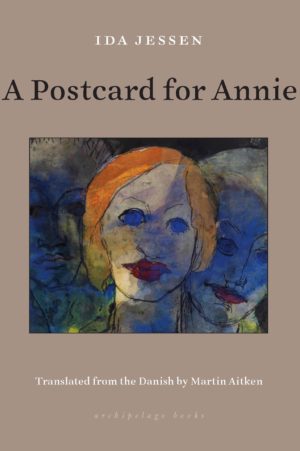A Postcard for Annie
by Ida Jessen, translated by Martin Aitken
reviewed by Jennifer Kurdyla
When I was a young literature student, I was taught that reading a novel is like moving in with a set of characters, occupying all the rooms of their house and observing their habits over a long period of time; by contrast, reading a short story is like walking by that house and peering through the window. The story collection A Postcard for Annie, by acclaimed Danish author Ida Jessen, offers precisely that kind of glimpse into the worlds of her six protagonists. Achingly intimate, the stories introduce us to women facing various degrees of inner turmoil. What we see are poignant reflections of the deepest sufferings and pleasures of the human heart—shadow selves that dwell side by side in each of our homes, waiting for someone like Jessen to open the curtains and let the day in.
A Postcard for Annie is the third of Jessen’s six books to be translated into English. Besides writing herself, she also translates of the work of Alice Munro and Marilynne Robinson into Danish—a silent collaboration feels like no accident, as her sensibility and sensitivity to language mimics that of these American authors. I’d add to the list of comparable writers Elizabeth Strout, whose eponymous protagonist of Olive Kitteridge could have landed in this collection if she had traveled to Denmark. The “psychological realism” for which Jessen is known brings together a range of minds in A Postcard for Annie—from newlyweds to children, graduate students to overburdened mothers. What’s most remarkable about this nimble narration (and Martin Aitken’s fine translation), though, are the similarities among these characters’ preoccupations. In the face of sudden loss—of love, of people, of security in daily routine—the characters all summon a self-possession that inspires as much as it unsettles the reader.
Nowhere is this more deeply felt than the story “December is a Cruel Month,” in which a mother of two young girls, Hanne and Marianne, mysteriously dies during her overnight shift at the local grocery store. As the children, especially the elder Marianne, undergo this swift loss of innocence amidst the cruel reminders of holiday festivities, we see that being forged by so fierce a fire does not necessarily yield impenetrability. Rather, the girls’ sensitivity rings like church bells on Christmas morning—sweetly, sharply, resonantly. Marianne assumes responsibility without a hitch; when neighbors come by to speak with their father, a not-so-subtle investigation into his potential culpability, she prepares a spread of tea and treats and is briefly interrupted by memory as she opens a cookie tin: “as she breathed in the smell of cinnamon, tears came to her eyes. She put the lid back on. But she and Hanne had baked some biscuits of their own, and those ones didn’t matter. She filled a plate with them and put it on the tray. The kettle whistled.”
Learning not just to survive suffering, but to continue with decorum, is a theme laced through all six of these stories. In “An Excursion,” Tove maintains her personal aesthetic, which manifests in the narration itself despite being third-person, even after her love, Max, leaves her; translator Tine, in “An Argument,” suffers in her work when she’s no longer able to relate to the love scenes she tries to bring to life on the page, yet rises above it; and Lisbet, in “Mother and Son,” seeks to chart a path of unconditional love for her behaviorally challenged son. In all these stories, Jessen presents women who, in other contexts, would appear complacent; here, though, their surrender to imperfect realities yields a more nuanced and memorable flavor—the spike of cardamom that turns a typical, sweet love story into something a bit bitter, a bit sharp, a bit unexpected.
While interesting for the reader to observe from the street, A Postcard for Annie nonetheless provokes deep investigations into our potential failings. This is highlighted most in the titular story, in which graduate student Mie watches a disturbed woman walk in front of a bus just moments after having talked to her. Mie’s attempt to have helped might seem like enough from afar, but becomes complicated when we see how her insecurities might have been at play—she’d been “making such an effort lately not to be shrill” and trying “to behave like an adult.” If behaving like an adult requires suppression of our inherent, animal compassion, then what kind of adulthood is Mie entering?
Living in any city, you learn that it’s best, maybe even safest, to keep your head down and not make eye contact with the people around you. A Postcard for Annie is a refreshing, paradigm-shifting lens into a different kind of life—to the small towns of this world, where not only does everyone know everyone else, but they all look each other square in the eye, even if they also draw the curtains tightly to keep out the dark night.
Published on August 30, 2022

